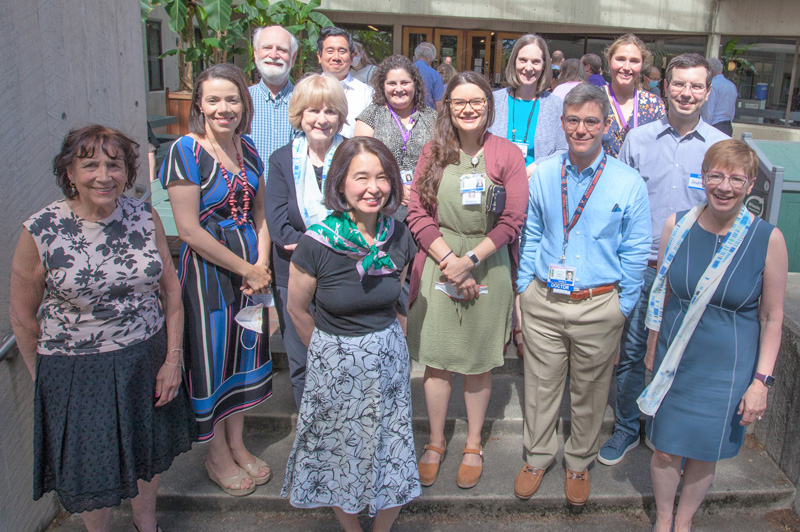Home / About / Center Grants / UCEDD /
 The Genetics Program comprises clinics that serve individuals at risk for or with a genetic disorder or disability. Clinics offer diagnosis, assessment, treatment, and counseling services to meet the needs of these clients. Clinics also provide information on current research, support groups, and other community resources to help individuals and family members understand and manage the condition.
The Genetics Program comprises clinics that serve individuals at risk for or with a genetic disorder or disability. Clinics offer diagnosis, assessment, treatment, and counseling services to meet the needs of these clients. Clinics also provide information on current research, support groups, and other community resources to help individuals and family members understand and manage the condition.
The Genetic Medicine Clinic provides complete care for adults with genetic and genomic disorders. They offer evaluations, tests, counseling, and management for all types of genetic conditions. The clinic has specialized doctors who treat various conditions like cancer syndromes, genetic disorders affecting the body’s chemicals, neurological disorders, and more. They also have genetic counselors who assess the risk of cancer, provide counseling, and offer genetic testing before pregnancy.
Genetics Program
Genetics Program: Projects
Contact: Debbie Olson (206-598-4030)
Core Function: Clinical Services
The purpose of the Autism Genetics Clinic is to evaluate and diagnose the cause of autism in children and adults.
A subset of patients with ASD has an identifiable genetic cause, and for those families it answers the question of “why” the child has autism. A specific cause can provide the family with information about prognosis and enable precise determination of recurrence of autism in other children in the family.
The outpatient clinic visit for a new patient takes place with a physician who is a specialist in Neurology and Genetic Medicine and a genetic counselor. A three-to-four generation family pedigree is taken. A complete medical history of the child is also taken, and a physical examination is performed.
Copies of any prior laboratory results, as well as any neuroimaging studies, are obtained and brought to the visit where they are reviewed. Clinic personnel then discuss their assessment and recommend any further clinical genetic tests which are typically done on blood or urine.
Results are discussed with the family at a follow-up visit or by telephone, and a summary is sent to the child’s primary doctors and other providers as requested by the family. Families who seek a clinical genetic evaluation often do so for the following reasons:
- There is family history of multiple people with ASD;
- Other medical problems or distinctive features are present;
- Patients have a test result that is difficult to interpret; or
- A patient’s family is interested in genetic research studies, and comes to the clinic in order to exclude known genetic causes prior to enrolling in a research study.
Contact: Vicki Frasher (206-598-1800)
Core Function: Clinical Services
The Biochemical Genetics Clinic provides evaluation, consultation, and management services to clients of all ages with a variety of metabolic disorders. Metabolic disorder is a term that encompasses a variety of disorders that result from an inherited inability to produce a particular enzyme necessary for normal metabolism of proteins, fats, or carbohydrates.
Because inherited metabolic disorders are rare, many providers are unfamiliar with the complex treatment regimens and other health needs associated with a particular disorder. Consistent and ongoing nutritional therapy to compensate for the missing enzyme is necessary for a person born with one of these disorders. Without therapy, toxic chemicals build up in the blood and tissues, and can lead to permanent intellectual disability and other disabilities.
Clinics are conducted by an interdisciplinary team that includes a pediatric geneticist, metabolic nutritionist, genetic counselor, and psychologist. Management of these disorders generally requires precise manipulation of diet using specialized medical formulas and foods, along with medications.
Most children have regular laboratory testing to monitor their management. Staff provide counseling about the heritability of particular disorders and guidance on family planning.
Contact: Peg L. Cheng (206-543-1915)
Core Function: Professional Training
The University of Washington Genetic Counseling Graduate Program (GCGP) at the IHDD trains future genetic counselors who will join the workforce that’s ushering in the new era of precision health.
This program is built on the firm belief that genetic counseling should be available to every person and delivered in an accessible, patient-centered manner. Genetics is a journey that every person approaches from their own unique background and experiences. Genetic counselors must quickly assess where a person is, identify where they need to go and then guide them along the way.
This is what makes our profession so rewarding and at the same time so challenging. Through your training in the GCGP, future professionals will acquire the skills and knowledge needed to meet these challenges and reap the rewards of this dynamic profession. Graduates of the Genetic Counseling Graduate Program earn a Master of Science degree from the Division of Medical Genetics in the Department of Medicine.
The program is accredited by the Accreditation Council for Genetic Counseling.
The Genetic Counseling Graduate Program:
- The Genetic Counseling Graduate Program (GCGP) is located at the IHDD, which houses research and clinics for neurodevelopmental disabilities with genetic causes.
- Genetic counseling students collaborate with IHDD clinicians to work with individuals and families affected by these conditions, aiding them in identifying their diagnoses.
- Students rotate through in-house clinics, including Fetal Alcohol Syndrome, Biochemical Genetics, PKU, and Down Syndrome, to gain hands-on experience.
- The GCGP includes training for students to become clinician researchers through capstone projects, with opportunities to collaborate with the LEND program.
- Apart from clinical and research training, students can engage in supplemental activities like patient advocacy and linking patients and families to resources.
Contact: Debbie Olson (206-598-4030)
Core Function: Clinical Services
The UCEDD’s Neurogenetics Clinic is co-sponsored by the Departments of Neurology and Medicine (Medical Genetics). The clinic’s purpose is to evaluate, diagnose and provide genetic counseling and long-term management for patients and families with a wide variety of genetic diseases of the nervous system. This clinic is also a clinical training site for medical students, residents, and fellows.
The Neurogenetics Clinic is a full-day clinic that meets three times each month. Each year the clinic serves over 300 clients who have an array of neurogenetic disorders including Huntington’s disease, Charcot-Marie-Tooth neuropathy, hereditary neuropathy, hereditary ataxias, muscular dystrophies, familial dementia, familial movement disorders, leukodystrophies, Neimann Pick type C, and others.
This clinic uses an interdisciplinary team approach that includes a neurologist, a neurogenetic nurse specialist, a genetic counselor and a medical social service worker. The patients receive examination, diagnostic testing, genetic counseling, attention to their social service needs and longitudinal follow-up. This represents a unique clinical resource in the state of Washington and includes an outreach clinic on an annual basis in Spokane and Yakima.
Contact: Vicki Frasher (206-598-1800)
Core Function: Clinical Services
The Phenylketonuria (PKU) Clinic provides diagnosis, assessment, medical nutrition therapy, genetic counseling, and consultation for ongoing dietary management and health supervision, as well as evaluation of treatment outcomes to adults and children with PKU and their families.
Phenylketonuria is a genetic disorder in which an individual is born without the ability to break down the amino acid phenylalanine (phe). This causes higher than normal levels of phe in the blood which results in damage to the brain and intellectual disability if left untreated. Fortunately, if a child is identified by Newborn Screening, diagnosed in early infancy, and receives appropriate treatment, normal physical and cognitive development can be expected.
The treatment of PKU requires lifelong management of phe levels regulated through the client’s diet and, for some individuals, the use of medication. Clinicians at the PKU clinic work with families and clients to ensure that the child is receiving adequate nutrients for normal development while limiting intake of foods high in phe in order to maintain safe blood phe levels.
The PKU Clinic is comprised of a team of trained health care professionals that represent multiple disciplines. Long-term interdisciplinary planning and follow-up services are provided to more than 100 children and 200 adults each year to prevent adverse consequences of this disorder.
In addition to traditional clinic visits, the program offers regular group activities. Focus is not only on medical and dietary health, but independent thinking and self-management skills facilitated by educational curricula. In addition, this format provides an opportunity for families and children to develop a strong support network. As the children near adulthood they can participate in the clinic’s Adolescent Transition Curriculum, designed to prepare them to independently manage their PKU management.
For more information, please visit the PKU Clinic page on UW-CTU.org.

